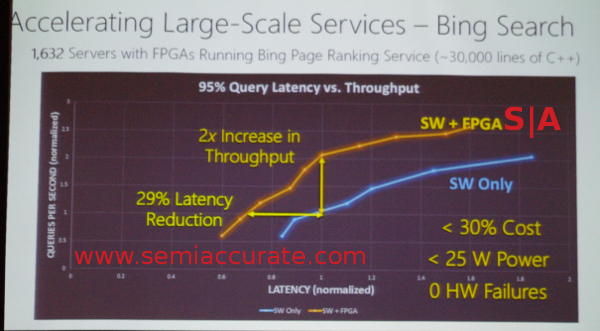FPGA 加速Bing
http://semiaccurate.com/2014/06/20/intels-fpga-announcement-simply-palpable-desperation/
Intel’s palpable desperation in the datacenter manifested itself in a knee-jerk reaction to Microsoft’s FPGA announcement at ISCA 2014. Intel is strapping an FPGA onto a Xeon just like SemiAccurate said they would in 2011 but it won’t save their bottom line.
The big story here isn’t the product or the vapor backed PR stunt as the case may be, it is how badly Intel has their backs to the wall. If you read the announcement itself, and I apologize for linking to something this wasteful of electrons, it is full of back-patting and cheer. Under the surface however the move was fueled by desperation and fear, and justifiably so.
Microsoft gave at talk at ISCA 2014 called, “A Reconfigurable Fabric for Accelerating Large-Scale Datacenter Services”, where they essentially put a PCIe based FPGA in their 2U servers. This lead to a massive gain in performance in Bing, something that over 18 users will appreciate. It also lead to a lot of headlines and a big mindshare leap for FPGAs in the datacenter, who would have guessed that FPGAs could accelerate search?
Mindshare shifts in the datacenter tend to have a detrimental effect on Intel’s stock price as analysts question Intel’s assertion that it is actually the only feasible solution there. They aren’t and are in the process of getting blown into the weeds if SemiAccurate’s view on what several datacenters are testing and their results are even close. It isn’t game over for Intel yet, but expect some heavy blows to be landing soon.
Intel has to deflect these hits any way they can so a fluffy announcement of, “hey we can do FPGAs too, see?” was in order. Strangely enough that came just a couple of days after Microsoft fired the first volley. The big difference between the two is that Microsoft had actual hardware, test results, deployment strategies, and showed them. Intel didn’t show a prototype. Intel didn’t say anything real because their fluff is just that, a PR ploy to deflect mindshare loss that could result in stock price loss.

Bing results with FPGAs
If you look at the results, you will see why Intel is scared silly, Microsoft saw either a 29% latency decrease in search results or a 2x throughput increase with the same latency using FPGAs. Worse yet they cost “<30%” of what the Xeon server did and used roughly 10% of the power that the Xeon’s alone did (Note: This is a back of the envelope calculation based on two heavily loaded Ivy-EP CPUs vs an ~25W FPGA board. If you add in memory for the CPUs, that number gets far worse for Intel). Microsoft made it very clear there were severe constraints on the FPGA program, one of the primary ones being no changes to the current server setup so it was over-CPU’d for feeding the FPGA, IE the best case for Intel.
If you could change the server to remove one CPU and replace it with four FPGA boards for the same rough cost and power envelope as the removed CPU, that would be a clean kill for performance. It would also allow you to use a cheaper 1S Xeon CPU instead of the vastly more expensive 2S capable Xeon-EPs. In short your performance would go up by a multiple and your costs would drop significantly, all for the same power budget.
This is a win/win for everyone but Intel. What is applicable to Microsoft/Bing is also applicable to Google and Facebook, for some reason Intel isn’t naming any partners for this FPGA effort. Why? Because it likely didn’t exist until the Microsoft news hit the headlines, then a research project was dusted off and mentioned publicly in ways vague enough to sound real to anyone not paying close attention. If you read the release/blog post by Intel closely, you will see it is a carefully crafted BS piece to intone that Facebook, Ebay, Google, and others are on board without actually saying that. It is hard to have partners for something that was just made up in the last 24 hours as a PR stunt.
Note: The following is analysis for professional level subscribers only.
Disclosures: Charlie Demerjian and Stone Arch Networking Services, Inc. have no consulting relationships, investment relationships, or hold any investment positions with any of the companies mentioned in this report.
...


